It is much better for our health not to treat any ARVI, but not to allow it to occur. But if you still could not avoid a cold, which antiviral agent is best used for treatment. There are many drugs on the Russian pharmaceutical market today, but which drugs are really worth taking for ARVI.
Frequent hospitalizations also violate the established home routine. Associated illnesses further complicate treatment. Some of them, such as hypertension, renal failure and visual impairment, force the attending physician to control hyperglycemia more aggressively because of the fear that a decrease in even a small part of the function of the affected organs under the influence of hyperglycemia could lead to disaster. This, however, also carries the risk of hypoglycemia.
The main goal of antidiabetic treatment in the elderly is to control hyperglycemia and associated symptoms, not necessarily to achieve glycemic control within the control range. The goal is primarily to maintain good general physical condition and a good quality of life even with higher blood sugar levels than in young and middle age. Higher values \u200b\u200bas well as too low values \u200b\u200bresult in higher mortality.
Why is it so important to treat ARVI
Our people do not consider ARVI a serious disease and "treat" it with hot tea with honey and raspberries. We often carry the infection on our feet without realizing that it could have dangerous consequences for us. In addition, in such a situation, we infect others with a virus, when there are many antiviral agents.
This suggests that glycemic control in older adults should not be aggressive or overly ambitious. Invalidity and mortality in the elderly can be reduced by addressing cardiovascular risk factors rather than by adjusting for increased hyperglycemia. Intensified glycemic control takes 8 years to reduce the risk of diabetic retinopathy or nephropathy, while the treatment of hypertension and dyslipidemia takes only 2 years to reduce the risk of cardiovascular disease.
Energetic and motivated patients can cope with and benefit from treatment that targets all goals, while weak and sick patients can support their treatment with numerous treatments, and some of them may also be ineffective.
By taking these drugs, we reduce the risk of complications such as otitis media, sinusitis, pneumonia, and bronchitis. By taking antiviral drugs, we protect our home and others from the spread of infection.
Even more troubles can bring ARVI to children, since it is they who most often have consequences in the form of ENT diseases or pneumonia. If a child catches a cold too often, then his immune defense is suppressed, allergic reactions often occur, and psychophysical development slows down. If the parents begin to take any antiviral agent on time, and also give it to the child for prevention, this will help to avoid infection and further undesirable consequences.
Less stringent goals should be assigned to patients with limited life expectancy and an increased risk of hypoglycemia, especially in the absence of symptoms of low blood sugar, and in the presence of stroke, dementia, mental illness, or alcoholism.
Hypoglycemia is the main limiting factor for good glycemic control in the elderly. Even mild hypoglycemia in the elderly can lead to a fall with injury, leading to long-term impairment of motor function. The incidence of severe or fatal hypoglycemia - a major risk with tight glycemic control - increases exponentially with age. On the other hand, pooled analysis of large randomized trials showed that intensive glycemic control does not reduce overall mortality in patients with diabetes, and only a slight decrease in mortality from cardiovascular disease, but not mortality from other causes.
Antiviral agents, widely used for colds, viral diseases and influenza, can be conditionally divided into several groups:
- Immunostimulants are drugs that for a short period of time enhance non-specific immunity, promote the production of interferon;
- Vaccines are special sera that stimulate the secretion of antibodies even before the onset of the disease.
These drugs, acting on the replication of the virus, block its reproduction. They can be based on both natural and synthetic origin, and are used as preventive measures against influenza and SARS, or for the treatment of these diseases. Generally respiratory diseases of viral etiology, modern anti-influenza drugs of a wide spectrum of action, drugs against cytomegalovirus and antiherpes are treated.
Therefore, the risks of intensive treatment outweigh the benefits in old age. Over the years, the mechanisms for regulating blood glucose levels increase. The compensatory increase in the glucagon content in the counter-insulin hormone is less. In order to control hypoglycemia at this time, the urgently secreted adrenaline plays a leading role. But some drugs, such as the widely used beta-blockers, can suppress the symptoms of hypoglycemia and further aggravate the adrenergic response. This is why older people have a stronger sense of hypoglycemia and less hypoglycemic symptoms.
If ARVI has a severe course, then antiviral drugs, with a mild form of infection, treatment with interferons is acceptable. As already specified, there are chemical and homeopathic preparations of antiviral action, in addition, they are subdivided into interferons and immunomodulators. Each of these groups is noteworthy.
Renal failure can further exacerbate this problem by reducing the clearance of oral antidiabetic drugs. In addition, hypoglycemic patients may mistakenly take extra large doses of medication. Adult patients with type 2 diabetes receiving insulin, sulfonylureas, or meglitinides should be monitored for symptoms of hypoglycemia. Older adults may have mainly neuroglycotic symptoms and less severe adrenergic symptoms. Of course, patients should be questioned about both types of symptoms at their next visit.
Synthetic antiviral agents
There is a whole list of synthetic antiviral agents that are actively used in therapy colds... These are quite effective drugs, and relatively inexpensive, among which it is worth highlighting Arbidol, Tamiflu, Acyclovir and Remantadin. The safest of these is Acyclovir, but its action, unfortunately, is limited to infections caused by the Epstein-Barr virus.
It should not be forgotten that hypoglycemia may also appear atypical in the form of transient hemiparesis, coma, or fall and be confused with stroke. If the patient has cognitive impairment, often falls down or takes care of daily activities, and no one helps him, then more liberal, less stringent glycemic control is required. Fuzzy eating in the elderly is more dangerous than obesity because it makes the antidiabetic dietary regimen at risk for hypoglycemia.
For patients at risk of malnutrition, a freeride menu with sufficient carbohydrates should be allowed. In addition, a drug to maintain glycemic control without hypoglycemia should be re-evaluated. Physical activity has a positive effect on hypoglycemia, weight and blood pressure. The best time to be physically active is 1 to 2 hours after meals, when your blood sugar is highest. However, it should be borne in mind that up to 24 hours after more physical activity, both hypoglycemia and hyperglycemia may occur, which requires a change in the treatment schedule.
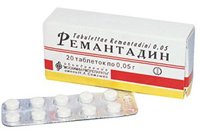 This is perhaps the most affordable antiviral agent in terms of cost. It is produced both in syrup and in tablet form. The drug is highly effective against group A viruses, especially at the beginning of infection with ARVI. Usually Remantadine is prescribed during epidemics of influenza, is contraindicated in children under one year old and pregnant women. Remantadine can cause side effects such as headache and dizziness, nausea-vomiting syndrome, increased fatigue and decreased attention, delayed reaction, tachycardia. On average, Remantadine will cost 50-170 rubles.
This is perhaps the most affordable antiviral agent in terms of cost. It is produced both in syrup and in tablet form. The drug is highly effective against group A viruses, especially at the beginning of infection with ARVI. Usually Remantadine is prescribed during epidemics of influenza, is contraindicated in children under one year old and pregnant women. Remantadine can cause side effects such as headache and dizziness, nausea-vomiting syndrome, increased fatigue and decreased attention, delayed reaction, tachycardia. On average, Remantadine will cost 50-170 rubles.
Metformin has other benefits: protective cardiovascular effects, reduced cardiovascular mortality, weight loss, anti-cancer effects. As a second stage of treatment with metformin, other antidiabetic drugs may be added: sulfonylureas, acarbose, gellanides, or injectables. Sulfonylureas, which stimulate insulin secretion, should be used with caution in the elderly as they can cause hyperinsulinemia with weight gain and an increased risk of hypoglycemia.
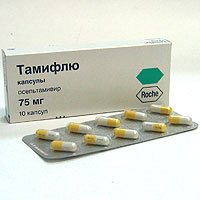 This is the latest generation of ARVI remedy, very effective against influenza infection. Tamiflu drugs are equally effective at any stage of infection. Studies show that after taking it, the duration of the fever and the risk of complications are halved. But, unfortunately, the remedy has a lot of side reactions, among which the most harmless are cough, lethargy, dizziness, diarrhea, nausea and headache... Tamiflu, according to researchers from Japan, is capable of provoking mental disorders, causing depression, psychosis or suicidal tendencies. Due to such a bouquet side effects, Tamiflu should never be taken by young children under 12 years of age. As for taking during pregnancy and lactation, the issue is controversial, so the doctor must make the decision. In addition to such adverse reactions, the drug has one more difference; the prohibitively high price of 1000-1400 rubles.
This is the latest generation of ARVI remedy, very effective against influenza infection. Tamiflu drugs are equally effective at any stage of infection. Studies show that after taking it, the duration of the fever and the risk of complications are halved. But, unfortunately, the remedy has a lot of side reactions, among which the most harmless are cough, lethargy, dizziness, diarrhea, nausea and headache... Tamiflu, according to researchers from Japan, is capable of provoking mental disorders, causing depression, psychosis or suicidal tendencies. Due to such a bouquet side effects, Tamiflu should never be taken by young children under 12 years of age. As for taking during pregnancy and lactation, the issue is controversial, so the doctor must make the decision. In addition to such adverse reactions, the drug has one more difference; the prohibitively high price of 1000-1400 rubles.
The disadvantage is its side effect - flatulence, however, which can be avoided by starting with a low dose and slowly increasing the dose over 2 months in order to continue the optimal dose on a consistent basis. The most physiological and safe treatment - This is a therapy using urgent drugs that have a physiological mechanism of action and do not carry the risk of hypoglycemia, because their effect depends on glucose, that is, they only reduce the level of glycemia. If oral combinations do not control hyperglycemia, insulin therapy is recommended.
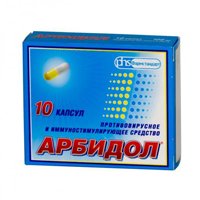 Arbidol's preparations are broad-spectrum antiviral agents that suppress viruses of groups A and B. There are practically no negative reviews about the drug, but the instructions indicate that Arbidol can cause Quincke's edema, stomach pain and all sorts of dermatitis. That is why this antiviral agent is not allowed to be used to treat children under 3 years of age. The cost of the drug Arbidol is ambiguous and can be 140-600 rubles.
Arbidol's preparations are broad-spectrum antiviral agents that suppress viruses of groups A and B. There are practically no negative reviews about the drug, but the instructions indicate that Arbidol can cause Quincke's edema, stomach pain and all sorts of dermatitis. That is why this antiviral agent is not allowed to be used to treat children under 3 years of age. The cost of the drug Arbidol is ambiguous and can be 140-600 rubles.
It is indicated for persistent moderate to high hyperglycemia and is the main treatment for patients with renal and hepatic impairment. Before starting insulin treatment in older adults, it is important to assess their visual acuity, hand dexterity and sensitivity, cognitive ability, family support, and health insurance given the financial burden of this treatment.
Elderly patients are not eligible for basal bolus therapy with slow-acting insulin plus fast-acting insulin before the three main meals. This therapy is loaded with many injections - 4 or 5 times a day and with different doses of injected insulin according to fluctuations in blood glucose levels as well as at fixed hours of the day. This makes life difficult for older people, they can often make mistakes and confuse either the dose, or the clock, the type of insulin, or the content of foods with more or less carbohydrates, and this poses great risks for hypoglycemia, including hidden nights of hypoglycemia.
Immunomodulators
This is perhaps the most extensive group of antiviral drugs that stimulate the production of their own interferon, which will subsequently fight the virus. The most popular drugs in this group are Imudon, Immunal, Methyluracil, Ribomunil, Isoprenosine, etc. These drugs are not used to treat acute respiratory viral infections, since the first manifestations of its action begin to be felt after a half-month intake.
Therefore, insulin treatment in the elderly should be as simple as possible. Every patient on insulin should have and be trained to use a portable meter to monitor their blood sugar at home. The counter is an indispensable assistant to the patient and his relatives for detecting hypoglycemia when he or she suddenly changes his behavior or disturbs his or her consciousness. Patients, as well as their relatives, should be trained by the attending physician for their behavior in case of established or suspected hypoglycemia, in order to urgently take the necessary emergency measures to overcome them.
Immunal
The drug mainly consists of echinacea juice, which has a specific effect on the body, resulting in a significant increase in resistance to ARVI. Due to the increase in the number of white blood cells and their increased ability to phagocytosis, microorganisms cannot penetrate into the body, and if they succeed, they are instantly destroyed by antibodies.
To treat the elderly, we must always be ready to optimize their treatment, which includes the following rules: Stop drugs that do not have a valid indication for a particular patient. Stop drugs that have not achieved therapeutic goals. Check regularly that patients are taking the drug both when increasing the dose and intending to include a new drug. Check all medications regularly, including dietary supplements, prescription drugs, vitamins, and minerals.
Encourage patients to maintain a medication list by treatment timeline. The bibliography is available on the editorial board. Dementia is a loss of mental capacity large enough to interfere with normal daily life that lasts more than six months, is not acquired at birth, and is not associated with a loss or distortion of consciousness.
Experts do not advise taking Immunal during lactation and pregnancy without medical advice. The drug is available in the form of tablets or nasal drops, the cost of which can be 240-280 rubles.
Interferons
In case of colds in babies, it is recommended to use antiviral drugs from the interferon group, since they are the safest and have a wide spectrum of action. These drugs have mostly positive reviews, since they have shown high efficiency against most of the existing pathologies of viral etiology. Interferon has an active effect on all possible ARVIs, and since it is produced in our body, the only negative reaction to its presence may be caused by hypersensitivity to a foreign protein.
Dementia is a group of symptoms caused by the gradual destruction of brain cells. The loss of cognitive ability resulting from dementia results in impairment of memory, mental ability, planning, and personality. Although the vast majority of people with dementia are older people, this condition is not an inevitable part of aging. Dementia is caused by certain diseases of the brain. The most common cause is Alzheimer's disease, followed by vascular or multi-infarction dementia.
Dementia is a loss of mental faculties. It is difficult to determine the prevalence of dementia - in part because there are differences in definition between studies and in part because a person's normal deterioration in functional ability appears with age.
Practice shows that taking such antiviral drugs for ARVI, you can get rid of a cold in a day or two, and the effectiveness of interferons is the same at any stage of infection. Medicines of the interferon group are available in the form of injections, nasal drops and suppositories. Among the most famous drugs in this group, it is worth highlighting Viferon, Grippferon, Cycloferon, Kipferon, etc. These drugs can even be used in the treatment of infants, and the low price of Interferon (about 50-100 rubles) makes it even more remarkable and affordable. Viferon and Kipferon are produced in candles, but Viferon has a synthetic base, which is why it has a smaller spectrum of side reactions.
Dementia affects 5 to 8% of people between the ages of 65 and 74 and up to 20% between the ages of 75 and 84. Between 2 and 4 million Americans suffer from Alzheimer's disease. While most people with dementia retire and do not suffer loss of income due to illness, the cost of caring for them is often enormous. The financial burden includes the loss of income for family members who took care of the patient, the cost of providing drugs and medical supplies, and home reorganization for safety.
Specialized home care can cost several thousand dollars a month. The psychological value can hardly be quantified. People with dementia lose control over many important aspects of their lives and their personalities, and relatives lose a family member as they struggle to cope with the burden of increasing dependence and unpredictability.
Experts do not recommend using antiviral drugs like Amiksin, Neovir or Cycloferon in the treatment of bronchitis and colds, since they contribute to the production of interferon not immediately, but after some time. It is advisable to take these drugs only as a prophylaxis.
Separately, a new drug for the treatment of ARVI Derinat should be distinguished from this group. This is also a very effective immunostimulant, but it starts to work much faster, providing a rapid synthesis of interferon to the child's body. The product is available in the form of nasal drops, which makes it easier to use even when treating babies. Derinat's preparations have no age-related contraindications, which is confirmed by numerous reviews.
For example, Svetlana from Tyumen claims that “I am very pleased with the drops. I took them during pregnancy. She cured ARVI almost instantly. "
But Catherine writes: “I treated my daughter with these drops for 3 months. The infection receded, not having time to start, probably on time to start treating ”.
Hence, it follows that Derinat is a universal children's medicine for colds. On average, the price of drops is 230-300 rubles.
Homeopathic medicines
Medicines of this group are quite often used in the treatment of colds and respiratory pathologies in children, and in older patients too. The most famous of them are Vibrukol, Aflubin, Otsillococcinum. It is very difficult to understand the effect of these drugs, but they somehow activate the immune system, that is, they have an immunostimulating effect. The average price of a drug, for example, Oscillococcinum, is 340-1150 rubles. (6-30 doses).
In general, taking antiviral drugs helps to reduce the duration of the ARVI course by several days, reduces the possibility of getting a complication from an infection or exacerbation of existing pathologies of a chronic form.
ARVI is one of the most common diagnoses made by doctors in the autumn-spring season. Infections are caused by various pathogens, so a person can suffer up to 7 cases of colds in a year. With ARVI, you cannot follow the principle "I will not be treated, it will pass by itself." After all, the main danger comes from complications that infection can cause.
Various medicines are used to treat ARVI.
Treatment of acute respiratory infections certainly. At the same time, it is not the number of days for which the disease will pass to the fore, but the quality of the treatment - that is, how much complications can be prevented. Treatment of ARVI in adults with drugs is aimed, on the one hand, at suppressing the harmful infectious microflora, on the other, at reducing and eliminating clinical manifestations disease. Also useful are auxiliary warming procedures, inhalation and taking medications that increase the body's immune functions.
Systemic therapy
To suppress viruses, specific antiviral drugs, drugs containing the immune protein interferon, or interferon inducers - drugs that activate the production of their own human interferon can be used.
Specific antiviral agents (Remantadin, Zanamivir) are fast acting. Medicines in this group are distinguished by a narrow spectrum of action, respectively, they can be used to combat a limited number of types of pathogens. This significantly limits the possibilities of drugs in the treatment of ARVI.
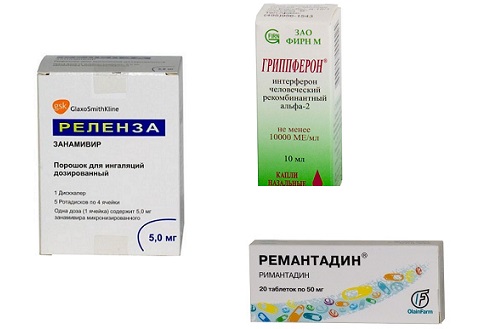
These funds are used to eliminate the symptoms of ARVI
Interferon preparations (Grippferon, Viferon) affect a greater number of pathogens. Like specific antiviral agents, they begin to act almost immediately after use. Available in the form of injections, suppositories, drops.
Means that activate the synthesis of their own interferon (Cycloferon, Amiksin) do not act so quickly - on average, 6 hours after application.
There are drugs for ARVI that have a complex effect: on the one hand, they stimulate the synthesis of interferon, on the other, they act on the virus, causing its death. Often used for the treatment of ARVI in adults, the drug Arbidol, which has such properties.
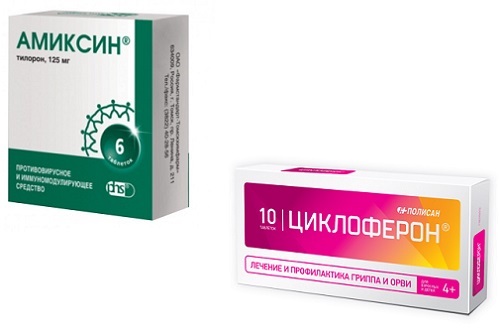
The presented drugs are used to activate the synthesis of their own interferon
Antibiotics for ARVI in adults are not prescribed, since they affect bacteria, while viruses are the causative agents of ARVI.
However, when joining viral disease bacterial infection and the development of complications, the use of antibiotics becomes reasonable and appropriate.
ABOUT Folk remediesused to treat ARVI in adults, see the video:
Symptomatic therapy
Assumes the appointment of drugs to eliminate the common cold, cough and temperature, fortifying agents.
To lower the temperature, non-steroidal anti-inflammatory drugs are used - Paracetamol, Ibuprofen. Funds reduce inflammatory process, contribute to the normalization of body temperature, eliminate pain and aches in muscles and joints. In terms of the severity of the anti-inflammatory and antipyretic effect, paracetamol is inferior to ibuprofen, but it is less toxic. The average daily dose of paracetamol for children over 12 years of age and adults is 2 g (500 mg per dose). Usually, this dosage is sufficient to obtain the desired antipyretic effect.
The temperature should not be lowered below 38 ° C.
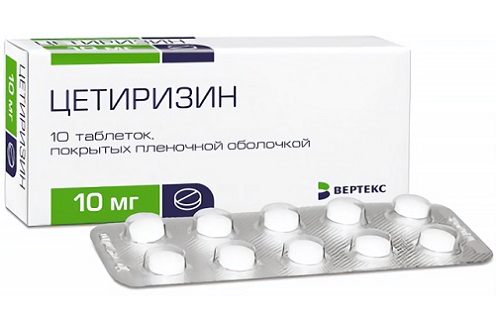
Cetirizine will help relieve inflammation and swelling
Antihistamines are used to eliminate swelling of the mucous membranes of the respiratory tract, to reduce capillary permeability. The drug of choice today is Cetirizine, a new, second generation antihistamine. On the one hand, cetirizine has a pronounced anti-inflammatory and anti-edema effect, relieves nasal congestion and improves nasal breathing. On the other hand, cetirizine has an indirect antiviral effect against rhinoviruses - it prevents their penetration into healthy cells of the body. Rhinoviruses cannot penetrate into cells and die after a short time. Thus, cetirizine inhibits the development of infection. However, it should be emphasized that the antiviral activity of cetirizine occurs only in relation to rhinoviruses.
First generation antihistamines (Diphenhydramine, Suprastin, Tavegil) are rarely used because they affect the central nervous system, causing fatigue and drowsiness. The drugs of the new, second and third generations - cetirizine, loratadine, desloratadine - do not have a depressing effect on the central nervous system.
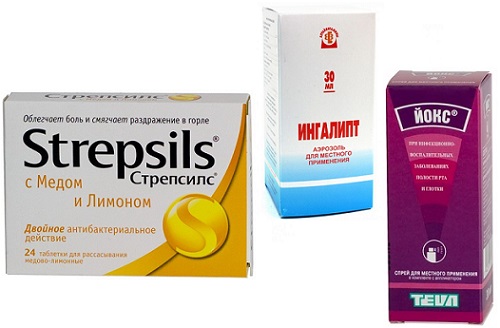
Antiseptic and bactericidal agents are effective against sore throat. Available in the form of lozenges (Strepsils, Septolete, Falimint), aerosols (Ingalipt, Yoks, Strepsils plus) and rinsing solutions (Yoks). Gargling with decoctions of medicinal plants - chamomile, calendula, eucalyptus, sage, oak is also effective. You can use solutions of furacilin, potassium permanganate, soda, saline solution... Rinsing procedures will be effective if they are carried out regularly, at least once every 2-3 hours.
Vasoconstrictor nasal and sprays reduce swelling of the nasal mucosa and improve their patency.
It should not be forgotten that vasoconstrictor drops with prolonged use, they can cause the opposite effect - an increase in the common cold and the development of a chronic form of the common cold.
In addition, haphazard instillation of the nose with drops with a vasoconstrictor effect provokes a thickening of the nasal mucosa, as a result of which dependence and addiction to the drug develops, and permanent nasal congestion is formed. It is impossible to correct such a complication without surgery.

Drops should be instilled in case of nasal congestion.
The choice is determined by the nature of the cough reflex and the secreted sputum. The main principle of cough treatment is to increase its effectiveness, since the act of cough itself is a natural reflex aimed at release respiratory tract from foreign bodies, including bronchial secretions. Therefore, suppressive cough reflex is used only in case of unproductive, obsessive, painful cough, which is not accompanied by sputum production. The appointment of an antitussive agent should only be carried out by the attending physician.
In other cases, antitussive drugs are prohibited. They can cause congestion in the lungs and trigger the development of pneumonia.
Drugs for treatment wet cough contribute to the liquefaction of a viscous difficult to separate secretion (, ACC, Fluditek), restore mucociliary transport and the work of the ciliated epithelium of the mucous membrane, facilitate the excretion of sputum from the lumen of the bronchi (expectorant drugs Lazolvan, Ambroxol,).
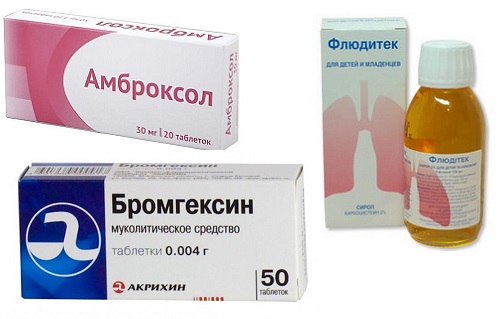
Medication is necessary for wet coughs
To increase the effectiveness of therapy along with drug treatment ARVI in adults with drugs, it is necessary to carry out auxiliary procedures:
- Patients with acute respiratory viral infections are shown bed rest, the violation of which can lead to a worsening of the condition and the development of complications.
- Consumption of large volumes of warm liquid (up to 2 liters per day) allows you to quickly remove toxins (waste products of viruses) from the body and thus helps to eliminate intoxication syndrome.
- Useful with alkaline solutions, decoctions of medicinal herbs.
- The nutritious diet should include light, wholesome food, mainly vegetable, high in vitamins.
A useful video by Dr. Komarovsky on how to treat ARVI in a child without any drugs, but it also applies to adults:
